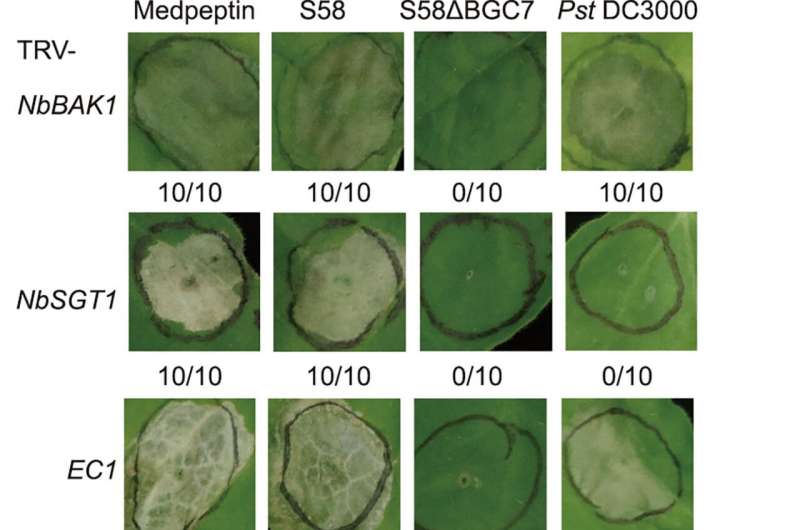This article has been reviewed according to Science X's editorial process and policies. Editors have highlighted the following attributes while ensuring the content's credibility:
fact-checked
proofread
New research unveils Pseudomonas cyclic lipopeptide medpeptin's role in modulating plant immunity

A research study conducted by Hai-Lei Wei's research team at the Chinese Academy of Agricultural Sciences in China has revealed significant insights into the biosynthesis and modulation of plant immunity by a novel cyclic lipopeptide called medpeptin, produced by Pseudomonas mediterranea.
The findings, published in Engineering, shed light on the intricate structure–function interactions of cyclic lipopeptides (CLPs) and open new avenues for the development of plant disease resistance strategies.
CLPs, multifunctional secondary metabolites produced by various bacteria, have emerged as key elicitors of plant immunity. However, understanding the mechanisms underlying CLP–plant interactions has remained elusive. This study focuses on medpeptin, a 22-amino acid CLP synthesized by a non-ribosomal peptide synthase (NRPS) gene cluster and regulated by a quorum-sensing system.
Contrary to previous CLPs, medpeptin does not exhibit antimicrobial activity. Instead, it induces plant cell death immunity and confers resistance to bacterial infection. Through comparative transcriptome analysis and virus-induced gene silencing (VIGS), the research team identified specific immune signaling candidates involved in medpeptin perception in Nicotiana benthamiana, a model plant species.
The study highlights the critical role of a cell-wall leucine-rich repeat extensin protein (NbLRX3) and a receptor-like protein kinase (NbRLK25) in mediating medpeptin-triggered cell death and resistance to pathogen infection. Silencing these proteins compromised the immune response, emphasizing their importance in medpeptin-induced plant defense mechanisms.
The identification of medpeptin and its unique mode of action provides valuable insights into the noncanonical mechanisms of CLP sensing and their impact on plant immunity. These findings pave the way for innovative biotechnological applications aimed at enhancing plant disease protection and crop productivity.
This study reveals a previously unknown mechanism by which CLPs modulate plant immunity through cell-wall perception and cytoplasmic signaling. Understanding these intricate interactions opens up new possibilities for developing effective strategies to enhance plant disease resistance.
The team's discoveries have far-reaching implications for agriculture, offering promising avenues for the development of sustainable and environmentally friendly disease control methods. Harnessing the power of medpeptin and other CLPs may revolutionize plant protection strategies, reducing reliance on traditional chemical pesticides and promoting healthier, more resilient crops.
The paper "Pseudomonas Cyclic Lipopeptide Medpeptin: Biosynthesis and Modulation of Plant Immunity" is authored by Yi-Lin Gu, Jun-Zhou Li, Yan Li, Shen Cong, Jing Wang, Yi-Nan Ma, Hai-Lei Wei.
More information: Yi-Lin Gu et al, Pseudomonas Cyclic Lipopeptide Medpeptin: Biosynthesis and Modulation of Plant Immunity, Engineering (2023). DOI: 10.1016/j.eng.2023.05.016
Provided by Engineering





















